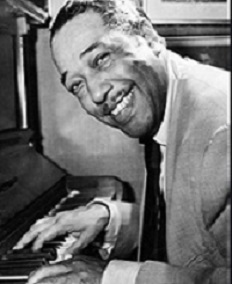Duke Ellington, Classic jazz Artist

A master at writing miniatures for the three-minute 78 rpm recording format, the late Duke Ellington wrote more than one thousand compositions; his extensive body of work is the largest recorded personal jazz legacy, with many of his pieces having become standards. Ellington also recorded songs written by his bandsmen, for example Juan Tizol’s “Caravan”, and “Perdido”, which brought a Spanish tinge to big band jazz.
In the early 1940s, Ellington began a nearly thirty-year collaboration with composer-arranger-pianist Billy Strayhorn, whom he called his writing and arranging companion. With Strayhorn, he composed many extended compositions, or suites, as well as additional short pieces. Following an appearance at the Newport Jazz Festival, in July 1956, Ellington and his orchestra enjoyed a major revival and embarked on world tours.
He led the orchestra by conducting from the keyboard using piano cues and visual gestures; very rarely did he conduct using a baton. By 1932 his orchestra consisted of six brass instruments, four reeds, and a four-man rhythm section. As a bandleader, Ellington was not a strict disciplinarian; he maintained control of his orchestra with a combination of charm, humor, flattery and astute psychology. A complex, private person, he revealed his feelings to only his closest intimates and effectively used his public persona to deflect attention away from himself.
Born: Washington, D.C, USA
Genre: Jazz, Swing
Duke Ellington was a music composer, pianist, and leader of a jazz orchestra, which he led from 1923 until his death over a career spanning more than six decades.
Ellington was based in New York City from the mid-1920s onward and gained a national profile through his orchestra’s appearances at the Cotton Club in Harlem. In the 1930s, his orchestra toured in Europe. Although widely considered to have been a pivotal figure in the history of jazz, Ellington embraced the phrase “beyond category” as a liberating principle and referred to his music as part of the more general category of American Music rather than to a musical genre such as jazz.
Some of the jazz musicians who were members of Ellington’s orchestra, such as saxophonist Johnny Hodges, are considered to be among the best players in the idiom. Ellington melded them into the best-known orchestral unit in the history of jazz. Some members stayed with the orchestra for several decades.
A master at writing miniatures for the three-minute 78 rpm recording format, Ellington wrote more than one thousand compositions; his extensive body of work is the largest recorded personal jazz legacy, with many of his pieces having become standards. Ellington also recorded songs written by his bandsmen, for example Juan Tizol’s “Caravan”, and “Perdido”, which brought a Spanish tinge to big band jazz.
In the early 1940s, Ellington began a nearly thirty-year collaboration with composer-arranger-pianist Billy Strayhorn, whom he called his writing and arranging companion. With Strayhorn, he composed many extended compositions, or suites, as well as additional short pieces. Following an appearance at the Newport Jazz Festival, in July 1956, Ellington and his orchestra enjoyed a major revival and embarked on world tours.
Ellington recorded for most American record companies of his era, performed in several films, scored several, and composed a handful of stage musicals. He was noted for his inventive use of the orchestra, or big band, and for his eloquence and charisma. His reputation continued to rise after he died, and he was awarded a posthumous Pulitzer Prize Special Award for music in 1999.
Duke Ellington was awarded the Grammy Lifetime Achievement Award in 1966. He was later awarded several other prizes, the Presidential Medal of Freedom in 1969, and the Legion of Honor by France in 1973, the highest civilian honors in each country. He died of lung cancer and pneumonia on May 24, 1974, a month after his 75th birthday, and is buried in the Bronx, in New York City. At his funeral attended by over 12,000 people at the Cathedral of St. John the Divine, Ella Fitzgerald summed up the occasion, “It’s a very sad day…A genius has passed.”
Biographical information courtesy of Wiki and Duke Ellington; for more reading see links below.
https://en.wikipedia.org/wiki/Duke_Ellington
http://www.dukeellington.com/ellingtonbio.html
